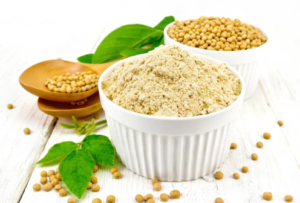As a vegan, you can easily stick to a high-protein diet, and if you choose the appropriate plant protein powder, you won’t have to worry about the drawbacks of ingesting plant-based protein while still gaining the muscle and bulk you seek.
When comparing the pros and cons, plant-based protein powder clearly wins out. There are now plant-based protein powders on the market that have been carefully created to provide the body with the minerals and protein it needs to not only gain bulk, but also maintain a healthy lifestyle.
Exactly what is a plant-based protein powder?
In order to supplement the body’s protein needs, you may take plant-based protein powders. They use substances derived from plants in their creation. The body can’t make the proteins needed for proper development unless it gets the required amino acids from these foods. In order to provide the complete set of amino acids needed to promote protein synthesis, plant protein powder are often derived from a wide variety of plant protein sources.

Grounded protein powder for daily use.
Types of plant-based protein powders
Perhaps you’ve been thinking about trying a plant-based diet. It might be that you just want to reduce or eliminate the amount of animal-based protein in your diet. You can be a vegan who is worried about getting enough protein. Whatever your backstory may be, here are different types of protein supplements-
-
Peas Protein
Not to be confused with the more common green pea, yellow split peas are the source of this superb protein source. Pea protein is rich in branch-chain amino acids, which is great news for those who are into fitness (BCAAs). Considering that many proteins don’t have enough of the amino acid leucine, this is extremely crucial. The main disadvantage of pea protein is that it does not contain enough of the amino acid methionine.
-
Isolated Protein from Brown Rice
Brown rice protein, like pea protein, is a good source of branched-chain amino acids (BCAAs). A few studies have shown that it has the same muscle-building potential as whey protein. Because of its low lysine content, brown rice protein should be supplemented with lysine from other plant foods. You should only buy brown rice plant protein powder from retailers that do thorough arsenic testing on their goods due to the high likelihood of arsenic contamination in brown rice.
-
HEM Protein
Although hemp seeds are rich in protein and essential fatty acids, they are deficient in the amino acid lysine, hence supplementing with legumes is recommended. Hemp, on the other hand, is a powerhouse of nutrients including omega-3 fatty acids, magnesium, fibre, zinc, and iron. Among the greatest plant-based proteins available today.
Benefits of plant based protein powder
You may be wondering what advantages plant protein powder have over conventional whey protein. So, what’s the catch? Here is a list few advantages here.
- All the protein you need to bulk up, even if you can’t digest dairy because of an intolerance or sensitivity.
- Hemp and pumpkin seed protein powders, in particular, are rich in additional vitamins and minerals that assist various bodily functions.
- If you eat this, you can put off feeling hungry for longer. Additionally, nutrients like chia may grow in the stomach and keep you feeling full for longer.
- Complete proteins and other nutrients may be consumed in a single meal if the correct foods are combined.
What to look for in protein powder?
You want to be healthier, so you look for plant-based protein powders. Because of this, it’s crucial to watch out for any potentially dangerous or superfluous components.
In addition, it’s important to receive all the amino acids you need by eating a variety of protein sources, so it pays to study labels and learn what to look for.
-
Clean ingredients
Make sure there are no questionable components on the label by reading it carefully. Many supplement manufacturers have gone to the trouble of getting their products verified by independent agencies like the Good Manufacturing Practices (GMP) system.
-
Various Sweetener Forms
Watch out for plant protein powder that include additional sweeteners that might increase your calorie and carb intake.
Artificial sweeteners like aspartame, on the other hand, haven’t been put through the wringer in terms of long-term safety testing.
-
Organic protein source.
When possible, go for a plant-based protein that has been certified organic so that you know it hasn’t been treated with pesticides or contains any other potentially dangerous substances.
You should also try to get a protein powder that does not use genetically modified organisms. Like with organic foods, merely look for a label stating that the product has not been genetically modified.
How to make use of protein powder?
Check out the ingredients and then choose a brand and taste that appeal to you. Keep in mind that although the thought of strawberry cheesecake may seem delicious now, you may become tired of it in a few days.
There’s never a bad time to eat chocolate. Because chocolate’s sweetness is so dominant, it may easily cover over less-than-desirable tastes, such bitterness or grit. The unflavored kind works well in a variety of recipes, including baking and smoothie making.
In order to make a protein shake quickly and easily, you need use a blender bottle and fill it with roughly eight ounces of almond milk or another plant-based milk like coconut milk.
To make a delicious smoothie for after your exercise, you may mix your plant protein powder with juice or additional components like peanut butter.
























